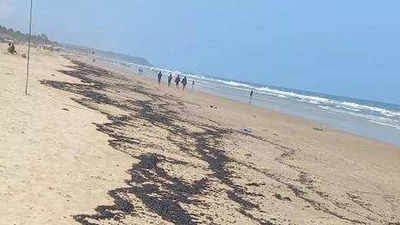Goa: Tourism department in the dark with 125 bags of tar balls

The tourism department said that when it approached an agency seeking advice for the safe disposal of the tar balls, it was asked for the chemical composition, following which it approached the state pollution control board.
PANAJI: The tar ball menace is affecting more than just Goa’s beaches. The tourism department, which is responsible for cleaning the beaches, is at its wits' end on how to safely dispose of the bags of tar balls that have been collected. Already this season, the department has collected 75 bags, each weighing nearly 40kg. Meanwhile, 50 bags of a dark, sticky and oily substance, similar to tar balls, which were collected last May from various beaches, are also lying on its premises.
Of the 37 beaches, 15 have been affected by the tar balls this year. Some of these include Keri, Calangute, Baga, Arambol, Mandrem, Miramar, Caranzalem and Siridao, Palolem, Rajbagh and Bogmalo.
Stating that the issue of tar balls is a serious one as it affects more than one state, and keeps recurring every year, a tourism official said that they are made to go from one department to another for safe disposal of the environmentally harmful substance.
“We are fed up with this problem. It is the same story every year. The chief minister had written to the Union ministry of environment last year. The ministry says a study is underway and the matter ends there for them, but not for us,” the official said.
When the department first wrote to the environment department seeking its advice more than a year ago, they were advised to approach the Goa State Waste Management Corporation (GSWMC).
“The GSWMC suggested an agency that we can go to. When we wrote to that agency, it asked us to give the chemical composition of tar balls. How are we supposed to have expertise to decipher the composition of tar balls? Subsequently, we went to the pollution control board, but no help came there, either,” he said.
Meanwhile, tourism officials said that this year, their collection of tar balls will be much more than last May. Also, picking tarballs that remain embedded in the sand is not an easy task. And with no solution or takers, the collected tarballs are put in plastic bags and stored in dust bins on the department’s premises for safekeeping.
Drishti Marine has also advised beachgoers to be cautious while walking on the beach.
Of the 37 beaches, 15 have been affected by the tar balls this year. Some of these include Keri, Calangute, Baga, Arambol, Mandrem, Miramar, Caranzalem and Siridao, Palolem, Rajbagh and Bogmalo.
Stating that the issue of tar balls is a serious one as it affects more than one state, and keeps recurring every year, a tourism official said that they are made to go from one department to another for safe disposal of the environmentally harmful substance.
“We are fed up with this problem. It is the same story every year. The chief minister had written to the Union ministry of environment last year. The ministry says a study is underway and the matter ends there for them, but not for us,” the official said.
When the department first wrote to the environment department seeking its advice more than a year ago, they were advised to approach the Goa State Waste Management Corporation (GSWMC).
“The GSWMC suggested an agency that we can go to. When we wrote to that agency, it asked us to give the chemical composition of tar balls. How are we supposed to have expertise to decipher the composition of tar balls? Subsequently, we went to the pollution control board, but no help came there, either,” he said.
Meanwhile, tourism officials said that this year, their collection of tar balls will be much more than last May. Also, picking tarballs that remain embedded in the sand is not an easy task. And with no solution or takers, the collected tarballs are put in plastic bags and stored in dust bins on the department’s premises for safekeeping.
Drishti Marine has also advised beachgoers to be cautious while walking on the beach.
FOLLOW US ON SOCIAL MEDIA
FacebookTwitterInstagramKOO APPYOUTUBE
Looking for Something?

Start a Conversation
end of article
Visual Stories
Quick Links

